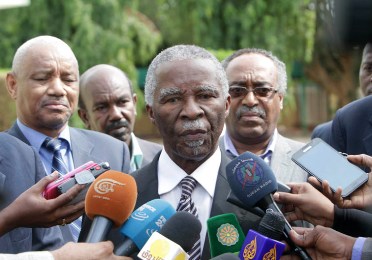AUHIP mediator to hold inclusive consultations on Sudan dialogue
March 16, 2016 (KHARTOUM) – The head of the African Union High Level Implementation Panel (AUHIP) Thabo Mbeki Wednesday has invited a newly formed opposition coalition to take part in an informal and inclusive consultations meeting with the government on the national dialogue process.

The former South African president is expected to meet with President Omer al-Bashir and the government negotiating delegation on Thursday before to fly to Addis Ababa where he organizes a meeting between the government and some holdout armed and political opposition groups on Friday.
In a statement issued on Wednesday evening, the FFC, which is mainly composed of dissident members of the ruling National Congress Party (NCP), said they accepted to take part in this meeting to discuss the confidence building measures necessary for an equal dialogue.
“The African mechanism delegation proposed to the alliance of the Futures Forces of Change to hold a meeting, organized by the AUHIP, with the government side to discuss and find solutions to the issues raised (with him)”.
“The Futures Forces of Change accepted the AUHIP proposal, in support of the peace efforts,” it further added.
The FFC delegation led by Ghazi Salah al-Din Attabani discussed with Mbeki ”The failure to create a conducive environment for the dialogue, the absence of key players, the lack of commitment to the road map, which was endorsed by the (National Dialogue) General Assembly and the Addis Ababa agreement; and the government’s attempts to divide the opposition and creating more than a (parallel) negotiation track”.
Based on an initiative launched by al-Bashir two years ago for a national dialogue, Mebki seeks to bring all the Sudanese parties to the negotiating table to discuss an agreement ending armed conflicts and paves the road for democratic reforms.
Up to date, the warring parties failed to reach a cessation of hostilities agreement. In addition, The government and the opposition groups didn’t strike a deal on how to organize the national dialogue or to define its goals.
Following their meeting with the AUHIP chief, the government spokesperson Ahmed Balal Osman said they briefed the chief mediator about the ongoing dialogue conference in Khartoum and told him that they endorsed many measures aiming to ensure freedoms and create a suitable atmosphere in the country.
A 7+7 member Osman Abu Almajd stated that Mbeki promised to organize a meeting between the holdout opposition groups and the dialogue coordination mechanism.
After the FFC meeting, Attabani told reporters that the consultations will be convened inside the country and without previous agenda.
He further said the meeting will include all the Sudanese parties, but no date has yet been determined.
The former presidential adviser said they informed Mbeki that they want a “dialogue that does not exclude anybody”.
MBEKI DIDN’T MEET NCF
However, the leader of left opposition alliance National Consensus Forces (NCF) Farouk Abu Issa Wednesday said the African Union mediator didn’t ask to meet them.
“Mbeki kept saying that the National Consensus Forces are not willing to participate in the dialogue. But this is not true because the NCF met him more than ten times during his frequent visits to Sudan and gave him about six memos in which the NCF clearly stated they are willing to participate in a genuine and productive dialogue,” Abu Issa said.
“(Such dialogue) requires the creation of a conducive environment by stopping war, allowing humanitarian access, and the release of political detainees and prisoners. Furthermore, the dialogue should lead to a transitional government and the dismantling of one-party state,” he stressed.
The African Union mediators believe that the NCF forces have a radical stance against the regime and want to dictate some preconditions before to join the process.
However, the SPLM-N sees the NCF as its strategic ally and repeats they will refuse a dialogue excluding the left parties.
(ST)
